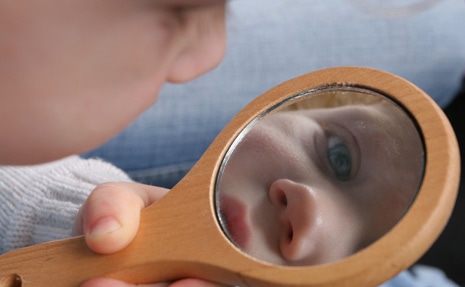Join me for a conversation on VoiceAmerica Empowerment, 4/29 @ 10am PT, with Alice Dreger about the conflict between scientific evidence and some interpretations of social justice and âempathyâ (in quotation marks). Dreger starts out as a graduate student exploring the condition known as âhermaphroditism,â people born with sex organs that are ambiguous as to male or female, now called âintersex.â In reading the text books studied by her medical student husband, she discovers the interventions performed to ânormalizeâ people sexually into the two canonical categories of male or female. The parents usually follow the recommendations of the physician-surgeon who are articulating a supposed community standard that oneâs genitals should unambiguously be either male or female. Dreger discovers that many of the people whose genitals were surgically transformed were subsequently lied to about their natal [birth] sex by well-intentioned doctors and well-intentioned parents following the well-intentioned doctorâs guidance. Find out what happens when Dreger’s research surfaces evidence that does not align perfectly with the some interpretation of a social justice agenda.
This is a powerful and disturbing work. Alice Dreger, Professor of the History of Medicine at the Feinberg School of Medicine at Northwestern University, delivers a compelling narrative. A penis smaller than a personâs adult thumb or clitorises larger than one little finger, according to (some) conventional wisdom, have got to go. I am not making this up. The standard procedure was to surgically âdeleteâ the offending member and surgically construct [some version of] the female genitals. This will, of course, resonate with Freudians everywhere as something motivated at the deepest levels of the unconscious. Not so Freudian is the proposition that if sex assignment from male to female and the raising of the infant as one rather than the other sex is the consequence, so be it. (Dreger is not interested in Freud in this text â that is my hobby.) Dreger discovers that many of the people whose genitals were surgically transformed were subsequently lied to about their natal [birth] sex by well-intentioned doctors and well-intentioned parents following the well-intentioned doctorâs guidance. Thus, the road to hell.
Dreger marshals evidence that people whose genitals are not surgically transformed as infants â but who have non-standard but otherwise healthy functioning genitals – are not worse off than those whose genitals were modified, and in many cases flourish. In at least one case, where the boy could not urinate standing up â and write his name in the snow with the stream of urine â due to the opening to the urethra being beneath the pen, the result of the surgery often produces a âcrippleâ. Yet the surgery continues to be performed. In other instance, the major concern expressed by the medical text books was that the child would become lesbian or gay. Ouch. Dreger âgoes to batâ for these intersex individuals, recovering their narratives out of medical records and journals where they had been documented as cases. She advocates for them. She lobbies, blobs, publishes in the popular press. Then the unintended consequences hit. Some of those for whom she is advocating donât like some of the evidence Dreger publishes. It is not sufficiently âon pointâ about transgender issues being exclusively a function of a manâs brain born in a womanâs body or vice versa. The idea that a man could love himself as a woman and so want to become a woman does not compute. As one might expect, research produces subtle nuances that require more than a sound byte or even a blog post. Suddenly Dreger finds herself the target of anger from the advocates for whom she was lobbying. It is not pretty. It gets ugly. Think self-righteous indignation as an expression of narcissistic rage and having oneâs deeply felt values questioned by the evidence. There is no easy way to say it: some advocates of social justice seem to feel that the end justifies the means. The âmeansâ include rampant forms of bullying and in-your-face confrontation, including charges of dubious ethical violations, invalid research, fictional claims about the researcherâs relations with his or her children and family, and the posting of toxic gossip on the Internet. The cause may be righteous, but the behavior is wicked and mischievous if not heinous.
Dreger survives and is vindicated. But then she begins to wonder if her experience of the collision of scientific evidence with advocacy and versions of its conventional wisdom was exceptional. Like most survivors she asks: âIs it just me?â It is not. It reminds her of the conflict between Galileo and the sedimented beliefs of the Church of his time. A point that underlies Dregerâs work and may usefully be made more explicit: The facts of empirical science are fragile. Not only can they be shouted down by bullies, purged by tyrants such the Italian Inquisition of the 16th century, or simply ignored by the average person, the facts can also be set upon by academic, university, or institutional agendas more dedicated to building a corporate brand â and being financially well funded â than attaining an evidence-based version of the truth. (An early version of this thesis, perhaps unknown to Dreger, is Hannah Arendtâs work on Truth and Politics. Not a historian of medicine but of political theory, Arendt makes the powerful point that if all versions of Euclidâs Geometry had been destroyed, mathematicians would still be able to recreate formal geometry out of the a priori forms of space and time; but if Stalin had really succeeded in purging all examples that such a person as Leon Trotsky had existed, then we really never would have heard of such an individualâs factual existence. Facts are fragile. )
A case in point. It is conventional wisdom since Susan Brownmillerâs Against Our Wills (1975), that rape is primarily an act of power by the perpetrator (usually a man), not one of sex. While not primarily a scientific treatise, it becomes the basis for research that gathers sufficient evidence and the thesis âpower not sexâ becomes âconventional wisdom.â Enter a young (male) scholar who has a strong hunch he can prove an exception to the rule. No, sometimes rape is motivated by sex. Sometimes a guy, who has no prospect that the intended woman would have sex with him (but who he desires sexually) decides to use force. This naïve academic sees a dissertation topic that is a cut above the usual scholarly drivel. A dissertation is delivered to that effect. Not only does all hell break loose – he is silenced by angry activists – but it gets worse. The phone rings. It is a prosecuting attorney needing help with a case. The District Attorney is bringing charges against a perpetrator, an alleged rapist standing trial for his crime. The defense is arguing effectively that science has shown that rape is about power, not sex. The perpetrator could not possibly have been motivated to the crime by sex. Science says so. Wait a minute. Rape is never about sex? It is now a defense against rape that there was no other motive than sex? Since 1975 we have seen date rape and the use of incapacitating âdate rape drugsâ such as anesthetics facilitate the violation. Surely advocates and scientists can encompass the possibility that sometimes rape is about power, sometimes it is about sex, and sometimes, it is both (p. 125). Donât be too sure. There is a deep lesson about human nature here. Constant dialogue is needed to keep people in rational communication without distortion and manipulation. The desire to be righteous and justified is pervasive and extends across all political spectrums. The ability to listen has rarely been in such short supply.
In conclusion, Dreger offers reflections inspired by the Founding Fathers of the early days of the United States and such politician-statesmen as Benjamin Franklin. No stranger to risk, Franklin was both flying a kite in a thunderstorm and building a structure of government capable of correcting its own errors (not on the same day). Thanks to such men, we are all better off than Galileo when speaking truth to power. Free scientific inquiry needs a free social and fair political space to flourish. Justice requires access to accurate facts and a way of testing evidence that distinguishes fact from fiction The truth is vulnerable to the influences and distortions of the social organization of power. Granted that a scientist has not been burned at the stake for over 500 years, that is no reason for complacency. There have been many ruined careers and damaged lives due to bullying and political abuses. Dreger bemoans the âpush downâ of the press and investigative journalism â in short, the decline of the press beneath the pressures of a publishing market in distress, the Google-ad-industrial-complex, and on the Internet no one knows you are a dog. While the Internet is a multi-edged sword and sends fear into the hearts of tyrants everywhere, it is easy to abuse. It is a dubious format for rational discourse and evidence-based anything. That should not stop one from posting her or his peer-reviewed research (this is not an example of that) but it means one must also mount the soap-box on a regular basis.
Alice Dreger. (2015). Galileoâs Middle Finger: Heretics, Activists, and the Search for Justice in Science. New York: Penguin.
You can read the complete blog post HERE
And tune into VoiceAmerica/Empowerment 4/29 @ 10am PT to hear the full interview.





